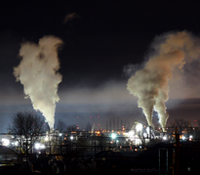Last week's discussion at the U.N. Security Council on the security implications of climate change was an important step in the right direction. This is only the second time that the subject, which may turn out to be the defining issue for global security in the 21st century, has made it onto the agenda of the U.N. body charged with maintaining international peace and security. The discussion's importance is limited, however, since the real path to addressing the security implications of climate change lies outside the council. The special session, initiated by Germany, focused specifically on the council's role in preventing climate-induced conflict over increasingly scarce food, water and arable land. The solution to these conflicts, however, can only be found in reducing carbon emissions -- including by scaling up the deployment of renewable energy technologies and increasing energy efficiency measures -- and not in responding to climate crises once they have occurred.
The physical effects of a warming climate are now widely regarded as, in the words of the U.K. National Security Strategy document, "risk multipliers." Everyone from the U.S. National Intelligence Council (.pdf) to the Royal Society (.pdf) has highlighted the link between the consequences of higher global temperatures and human insecurity.
Yet connecting the severity of the various threat assessments with a commensurate effort to shift the global economic system to a low-carbon pathway has proved difficult. While significant diplomatic energy has been expended, particularly on building the institutional architecture for what might be termed "global climate governance," this has not been matched by the requisite political will within countries or trust between them to effectively manage this global challenge. While high-level rhetoric abounds about the need to reverse the trend toward a rapidly warming climate, the International Energy Agency estimates that despite the global economic downturn, global carbon emissions in 2010 were the highest in history -- 5 percent more than the previous all-time high in 2008.

